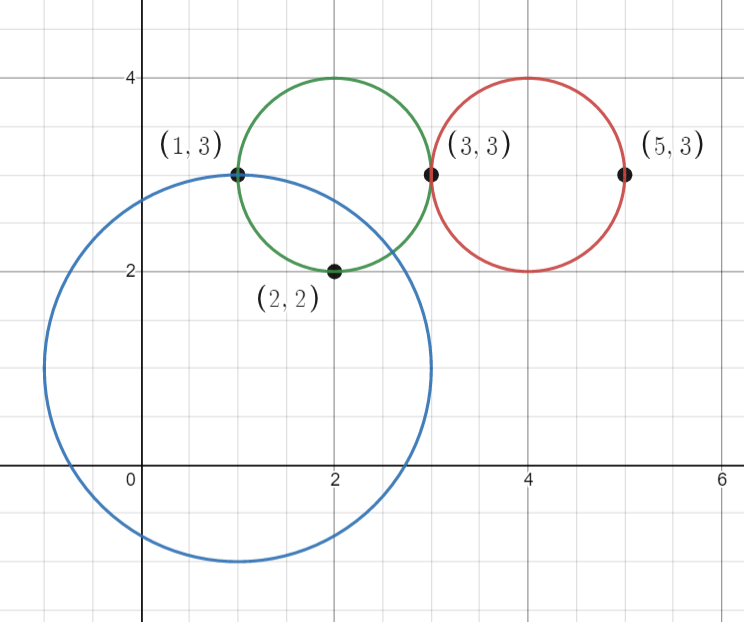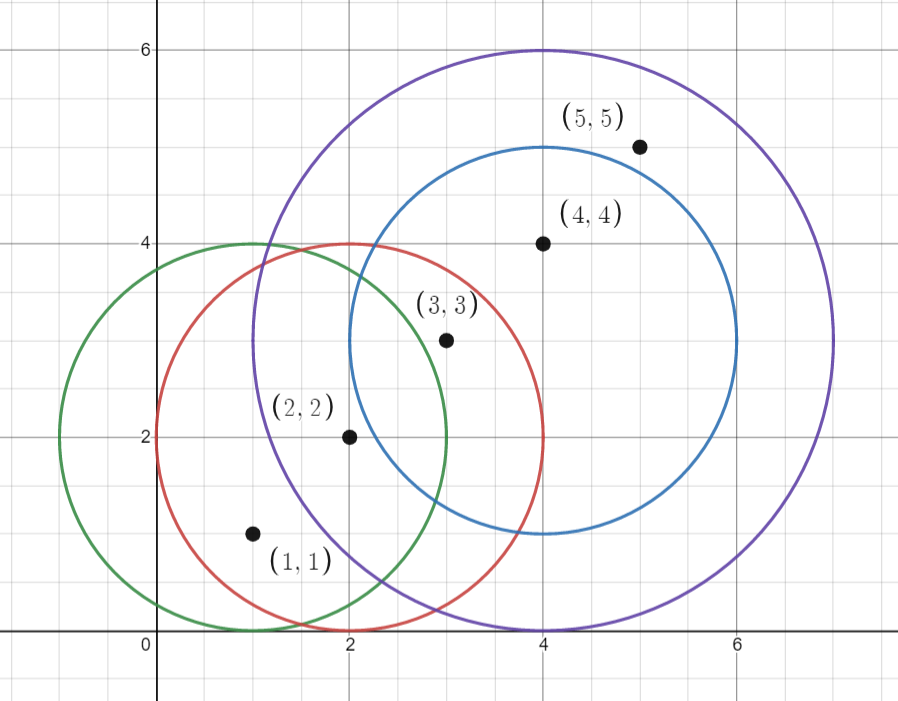| comments | difficulty | edit_url | rating | source | tags | |||
|---|---|---|---|---|---|---|---|---|
true |
Medium |
1380 |
Biweekly Contest 50 Q2 |
|
You are given an array points where points[i] = [xi, yi] is the coordinates of the ith point on a 2D plane. Multiple points can have the same coordinates.
You are also given an array queries where queries[j] = [xj, yj, rj] describes a circle centered at (xj, yj) with a radius of rj.
For each query queries[j], compute the number of points inside the jth circle. Points on the border of the circle are considered inside.
Return an array answer, where answer[j] is the answer to the jth query.
Example 1:
Input: points = [[1,3],[3,3],[5,3],[2,2]], queries = [[2,3,1],[4,3,1],[1,1,2]] Output: [3,2,2] Explanation: The points and circles are shown above. queries[0] is the green circle, queries[1] is the red circle, and queries[2] is the blue circle.
Example 2:
Input: points = [[1,1],[2,2],[3,3],[4,4],[5,5]], queries = [[1,2,2],[2,2,2],[4,3,2],[4,3,3]] Output: [2,3,2,4] Explanation: The points and circles are shown above. queries[0] is green, queries[1] is red, queries[2] is blue, and queries[3] is purple.
Constraints:
1 <= points.length <= 500points[i].length == 20 <= xi, yi <= 5001 <= queries.length <= 500queries[j].length == 30 <= xj, yj <= 5001 <= rj <= 500- All coordinates are integers.
Follow up: Could you find the answer for each query in better complexity than O(n)?
Enumerate all the circles
The time complexity is queries and points respectively. Ignoring the space consumption of the answer, the space complexity is
class Solution:
def countPoints(
self, points: List[List[int]], queries: List[List[int]]
) -> List[int]:
ans = []
for x, y, r in queries:
cnt = 0
for i, j in points:
dx, dy = i - x, j - y
cnt += dx * dx + dy * dy <= r * r
ans.append(cnt)
return ansclass Solution {
public int[] countPoints(int[][] points, int[][] queries) {
int m = queries.length;
int[] ans = new int[m];
for (int k = 0; k < m; ++k) {
int x = queries[k][0], y = queries[k][1], r = queries[k][2];
for (var p : points) {
int i = p[0], j = p[1];
int dx = i - x, dy = j - y;
if (dx * dx + dy * dy <= r * r) {
++ans[k];
}
}
}
return ans;
}
}class Solution {
public:
vector<int> countPoints(vector<vector<int>>& points, vector<vector<int>>& queries) {
vector<int> ans;
for (auto& q : queries) {
int x = q[0], y = q[1], r = q[2];
int cnt = 0;
for (auto& p : points) {
int i = p[0], j = p[1];
int dx = i - x, dy = j - y;
cnt += dx * dx + dy * dy <= r * r;
}
ans.emplace_back(cnt);
}
return ans;
}
};func countPoints(points [][]int, queries [][]int) (ans []int) {
for _, q := range queries {
x, y, r := q[0], q[1], q[2]
cnt := 0
for _, p := range points {
i, j := p[0], p[1]
dx, dy := i-x, j-y
if dx*dx+dy*dy <= r*r {
cnt++
}
}
ans = append(ans, cnt)
}
return
}function countPoints(points: number[][], queries: number[][]): number[] {
return queries.map(([cx, cy, r]) => {
let res = 0;
for (const [px, py] of points) {
if (Math.sqrt((cx - px) ** 2 + (cy - py) ** 2) <= r) {
res++;
}
}
return res;
});
}impl Solution {
pub fn count_points(points: Vec<Vec<i32>>, queries: Vec<Vec<i32>>) -> Vec<i32> {
queries
.iter()
.map(|v| {
let cx = v[0];
let cy = v[1];
let r = v[2].pow(2);
let mut count = 0;
for p in points.iter() {
if (p[0] - cx).pow(2) + (p[1] - cy).pow(2) <= r {
count += 1;
}
}
count
})
.collect()
}
}/**
* Note: The returned array must be malloced, assume caller calls free().
*/
int* countPoints(int** points, int pointsSize, int* pointsColSize, int** queries, int queriesSize, int* queriesColSize,
int* returnSize) {
int* ans = malloc(sizeof(int) * queriesSize);
for (int i = 0; i < queriesSize; i++) {
int cx = queries[i][0];
int cy = queries[i][1];
int r = queries[i][2];
int count = 0;
for (int j = 0; j < pointsSize; j++) {
if (sqrt(pow(points[j][0] - cx, 2) + pow(points[j][1] - cy, 2)) <= r) {
count++;
}
}
ans[i] = count;
}
*returnSize = queriesSize;
return ans;
}
